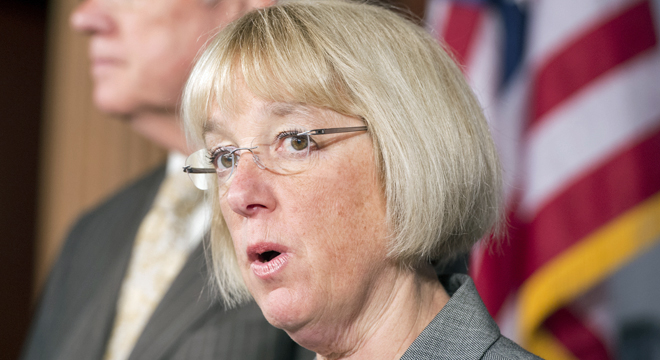Democrats aren’t going to let Republicans downplay the risks of not raising the debt limit, or to say that a quick legislative fix or two could prevent breaching the debt limit from precipitating a major credit event.
Republicans have taken to characterizing a debt limit breach as a minor disruption — a snag that would result in a partial government shutdown, but that would keep the nation’s creditors whole.
Since there’s no precedent for the government running out of borrowing authority, some leading Republicans even want to revisit an idea first proposed by Sen. Pat Toomey (R-PA) during the 2011 debt limit fight, to require the Treasury to prioritize debt service over other federal obligations.
“We should pass a bill out of the House saying there will be certain priorities attached to certain things, namely payment of debt services and payment of our military,” Toomey said on Laura Ingraham’s radio show last week.
That creates an opening for Democrats to remind the public how extreme the consequences of a debt limit breach would be, and how prioritizing creditors would make the crunch for ordinary Americans even worse.
“This proposal to prioritize payments to foreign creditors over those to seniors, families, and veterans is the wrong way to go and it’s an absolute nonstarter in the Senate,” said Senate Budget Committee Chairman Patty Murray (D-WA) in a statement to TPM. “Anyone concerned about the devastating impact hitting the debt ceiling would have on our economy and our credit rating should work with Democrats to do the responsible thing and raise the debt limit so the government can pay the bills we’ve already accrued.”
But as experts at the Bipartisan Policy Center have noted, prioritization isn’t technically straightforward, and may not even be possible, if debt service obligations exceed revenues on any given day.
After the last debt limit fight, in response to an inquiry from Sen. Orrin Hatch (R-UT), Treasury’s inspector general explained why prioritization is not feasible, and noted that the department had determined its least bad option would be to slow payments to a crawl.
“Treasury officials determined that there is no fair or sensible way to pick and choose among the many bills that come due every day. Furthermore, because Congress has never provided guidance to the contrary, Treasury’s systems are designed to make each payment in the order it comes due,” the IG wrote. “Treasury officials told us that it was the Department’s organizational view that the least harmful option available to the country at the time, of these very bad options, was to implement a delayed payment regime. In other words, no payments would be made until they could all be made on a day-by-day basis. Even under this option, Treasury officials acknowledged that, because the U.S. operates at a deficit, payment delays under such a regime would have quickly worsened each day the debt limit remained at its limit, potentially causing great hardships to millions of Americans and harm to the economy.”
It stands to reason that because the consequences of a default event would be grave and potentially permanent, that the Treasury would do its best to stave one off as long as possible. And while President Obama was clear in his Monday White House remarks that everything from Social Security payments to air traffic controller salaries will be in jeopardy if borrowing authority lapses, he tellingly omitted the country’s creditors from direct risk.
“If congressional Republicans refuse to pay America’s bills on time, Social Security checks, veterans benefits will be delayed,” he warned. “We might not be able to pay our troops or honor our contracts with small-business owners. Food inspectors, air-traffic controllers, specialists who track down loose nuclear materials would not get their paychecks. Investors around the world will ask if the United States of America is in fact a safe bet.”
But by proposing to explicitly holding creditors harmless, Republicans are clarifying who the true hostages are in the debt limit fight. Not major institutional investors or foreign governments but federal workers, and people who rely on government services every day.
“It’s unbelievable that even as we head toward the iceberg and Democrats are trying to turn the ship, Republicans are scrambling to make sure Chinese creditors are ahead of American seniors on the lifeboat line,” said a senior Democratic aide. “If this is what Republicans are going to hang their hats on while they fight to cut Medicare and Social Security and protect the rich from paying a penny more in taxes, then they may end up looking back to the debt ceiling fiasco of 2011 as a time when things went relatively well for them politically.”










